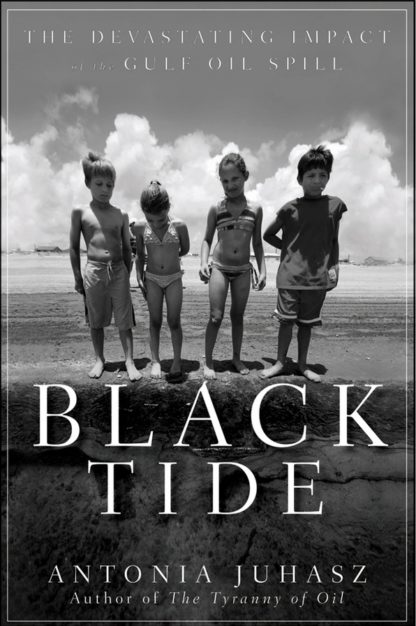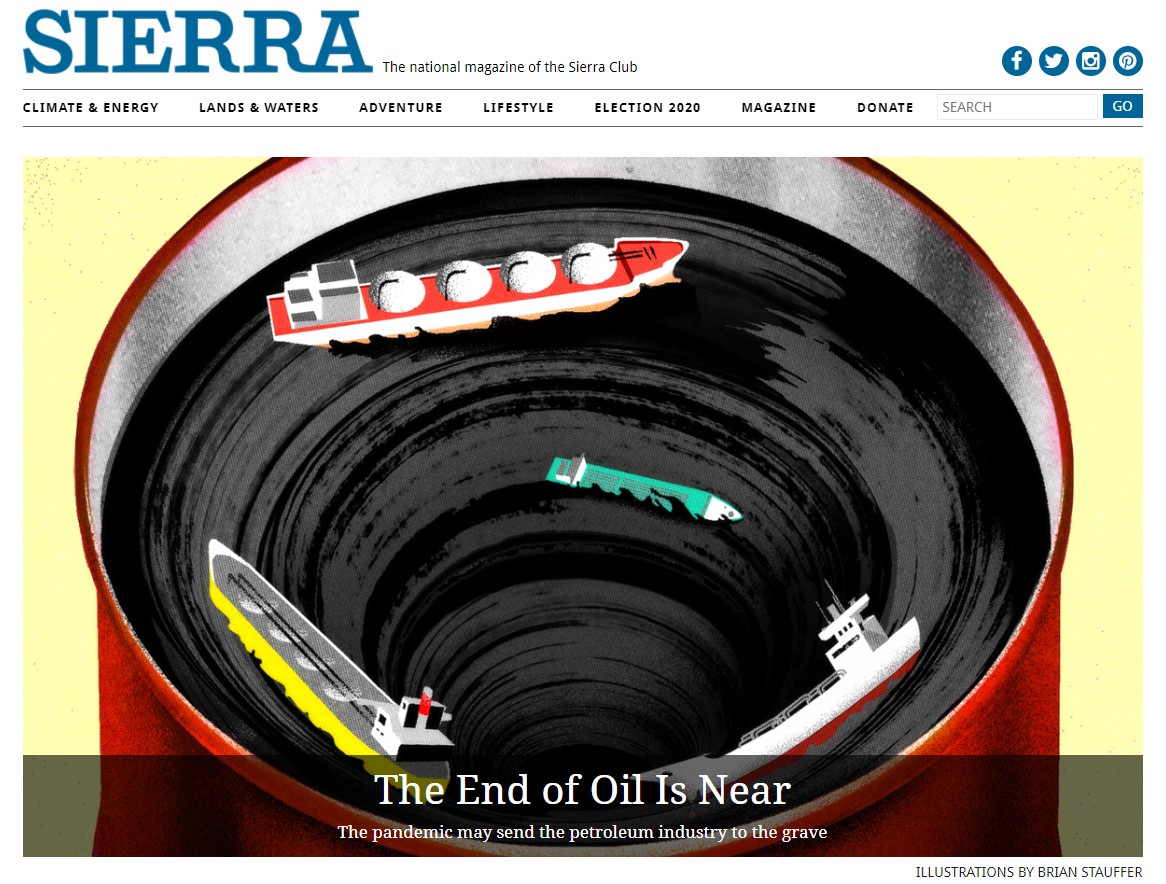Janine Jackson interviewed journalist Antonia Juhasz about the end of oil for the September 18, 2020, episode of CounterSpin. This is a lightly edited transcript.
Janine Jackson: Dow Jones dropped ExxonMobil from its blue chip stock market index, a spot it had occupied since 1928. Major banks are talking, anyway, about divesting from oil and gas; hundreds of US institutions, including colleges, have done so. And, of course, hundreds of millions of people globally have spoken out, marched and agitated against a fossil fuel industry that is despoiling ecosystems, driving climate disruption, distorting international relations, and wreaking havoc on the lives and communities of mostly poor, mostly people of color around the world.
A convergence of factors, plus Covid, suggest we are seeing the irreversible decline of the oil industry, and its stranglehold. But how do we manage that? And, what comes next? Our guest says that has a lot to do with us.
Investigative journalist and author Antonia Juhasz has been writing about oil for years now. Her most recent book is Black Tide: The Devastating Impact of the Gulf Oil Spill. She joins us now by phone. Welcome back to CounterSpin, Antonia Juhasz.
Antonia Juhasz: Thanks so much for having me. It’s great to be back with you.
Sierra (8/24/20)
JJ: I’d like to talk about these companion pieces you’ve just written, “The End of Oil Is Near” and “Bailout.” They appeared in the magazine Sierra. Would you talk, first, about the convergence of factors that spelled the end of the oil industry before coronavirus? And then, what’s been the impact of the pandemic on that movement?
AJ: Yeah, I think those problems can really be boiled down to an industry that’s been producing a product that people and the world have been trying to get away from, and succeeded in getting away from. And the reason why people have been trying so hard to get away from it is manifold, but it amounts to the contribution of oil and fossil fuels to the climate crisis, and the experience of people who live where oil operations take place, whether that’s exploration or drilling or transport or consumption or dumping. The voices of those people have been increasingly listened to and elevated and responded to, because of the problems that they have faced, the host of problems they face, from public health to the environment to politics to economics.
And their voices are being listened to more and more, which has helped spur movements for alternatives, accessible and affordable alternatives; a shift demanding a politics that doesn’t continue to subsidize the oil industry to the detriment of those alternatives, and doesn’t favor those companies over companies that provide alternatives to fossil fuels. So a weakening of the political power, and a response to that shift: a desire to move away from oil being reflected in policy changes that are moving that needle further away.
All of that has resulted in a decline in the growth of demand for oil, which really started to accelerate in 2015. So a weakening of demand, a weakening of price for oil, and then—in response to that weakening demand and the weakening price the producers could get for their product–to try and make the same amount of money, they kept producing more and more and more.
And the US was really at the forefront of this problem, just producing more and more and more, reaching record levels. In the last year of the Obama administration, the US was producing less oil than the year before. And then, under the Trump administration, we just reached record highs of production. That was also happening globally.
So we had, starting in 2018 in particular, just this glut of oil, way too much product, not enough demand for it, a low price in return for it, but the producers kept making more and more and more and more. So you’ve got too much product, not enough money to be made off of it, not enough demand for it, and that also meant that the economic returns to these companies were failing. So their profits were collapsing, investors were starting to look elsewhere, banks were starting to look elsewhere. And the interest in the companies was waning, and the ability to make money off of them, and their ability to make money, was waning.
And this all built up to the perfect visual encapsulation of this: Before the coronavirus hit, the oil industry was already facing a glut. Then when the virus hit, and people started responding to stay-at-home orders and they were staying at home, and they weren’t driving and they weren’t flying, and products weren’t moving as much, so trucks weren’t moving as much to move products around, but the companies and the countries kept producing oil. And then we have these armadas of oil tankers floating around the ocean in harbors. So people who live in California saw them, people who live on coasts around the world, just saw this buildup of tankers in harbors in the ocean, and that was oil being stored at sea, because there was just too much of it and nowhere to put it.
And a lot of those tankers are still floating around right now, on this hope that the oil company has that someday its oil will be worth more tomorrow than it is today, so they’re sticking it at sea to wait for that moment. But if I’m right—and Moody’s, for example, has predicted that 2019 was the height of oil demand ever, that we’re never going to demand as much oil as we did that year; BP has also predicted the same thing—then that oil isn’t going to see a brighter tomorrow and, instead, what needs to happen is they just need to stop producing so much of a product that we really don’t want.
JJ: I very much like the way you put people and protest at the center of change, rather than saying, “Oh, well, the profits are shrinking, the market spoke,” or something like that, putting that first. Everything we understand about environmental and human health points to “keep it in the ground.” And yet we’re forced to watch this daylight nightmare of companies pushing to drill for every last drop, causing all kinds of harms. It reminds me of the expression, “Who’s going to be the last man to die for a mistake?”
But the industry, as you explain, is doing that, and can do that, because of government policy, including Covid policy. So folks may have suspected it was happening, but you spell out some ways that the Trump White House is propping up the oil industry right now. What should we know about that?
AJ: So first of all, the activism and the market forces are intimately related; they are operating as a response to one another. So the activism is changing the market forces, and the market forces are responding to the activism. So activists are targeting banks, they’re targeting investment funds like BlackRock, and they’re saying, “We don’t want you investing in fossil fuels anymore.” And the banks and the investment funds and investors are responding. So trillions of dollars of investments have been moved out of the fossil fuel sector in a direct response to activism pushing those changes. There’s definitely still holdouts, particularly banks and investment funds, but there’s a response that is happening; these forces are working in tandem, and should be understood as not independent of one another.
JJ: Right. Right.

Antonia Juhasz: “The actions of the public to push public policy are really the determining factor on what’s going to happen with the industry.”
AJ: So we’re basically very much at this moment where the actions of the public to push public policy are really the determining factor on what’s going to happen with the industry. Right now, the International Monetary Fund has estimated that the global fossil fuel industry is subsidized to the tune of some $5 trillion a year. So this is an industry that is very much propped up by government policy. And government policy right now really can be the deciding factor on if fossil fuels, and oil in particular, continue to be propped up. And the Trump administration has definitely come in to try to do that, really, with their Republican allies in Congress, because the Democrats have definitely pushed back against these plans, but so far, they’re moving forward.
The Trump administration first said, “We’re going to bail out the fossil fuel industry.” And Democrats said, “No, that’s not going to happen.” So what we ended up with was three somewhat stealth measures to do that.
The first is that a very large number of oil companies have been supported by the CARES Act, through the Paycheck Protection Program. And this research organization, Documented, did research for me for my Sierra magazine articles, and Documented found that some 7,000 oil and gas companies have received as much as $7 billion in Paycheck Protection Program money, and that’s gone to what I would consider rather large oil companies.
And it’s also contributed to the overall bias of the Paycheck Protection Program towards white male businesses that we’ve seen, because the oil industry is globally, by and large, run by white men. And in the United States, full-time employees of oil companies also tend to be white men. So when we looked at the companies that stated their ownership, the oil and gas companies were definitely disproportionately white male–owned as well.
So that’s a lot of money. And then the Republicans really snuck in a tax loophole into the CARES Act, which the Democrats have been trying to close. And through that tax loophole, at least 50 publicly traded oil and gas companies have taken at least $3 billion. And I’m really emphasizing the “at least,” because no one has collected this information.
JJ: Right.
AJ: What Jesse Coleman, the researcher at Documented, did was literally just look up the Securities and Exchange Commission information that is published by publicly traded companies, that’s required–it’s basically their tax information–and just looked up oil and gas companies to see which ones publicly stated that they took this tax loophole. But, of course, that only includes the companies he was able to look up, and it doesn’t include any privately held companies, because they don’t have to release this information, though there are a lot of privately held oil and gas companies in the United States. A lot of fracking companies are really just owned by hedge funds that are just trying to make money, are not oil and gas companies, they’re really just hedge funds, and they don’t have to share this information. So 50 companies made at least $3 billion that way.
But the biggest pool of money is coming out of these changes that happened through the Federal Reserve, under lobbying by the Trump administration. And it’s unknown how many hundreds of billions of dollars this could end up being. But the Federal Reserve implemented several new programs. And I would just preface this by saying: The Federal Reserve needed to take action; we need to save the economy from Covid. But these actions included new mechanisms that are overweighted in fossil fuels, so more weighted in fossil fuels than their counterparts in the regular market.
And essentially, for the first time ever, you and I, the American taxpayer, through the Federal Reserve, now own the debts of some of the largest oil and gas companies in the world—Exxon, Chevron, Energy Transfer Partners (the pipeline company behind Dakota Access Pipeline)—you name it, we now own their debt. So we’re backing up these companies. And the Federal Reserve is essentially sending a message to the market that the fossil fuel industry will be supported. So that ExxonMobil, the day after these programs were announced by the Fed, went out and sold nearly $10 billion in the debt market. So being propped up to the tune of nearly $10 billion.
So this is all just this sort of mass subsidization through the Fed, that is overweighted in fossil fuels, and that’s deeply problematic. So those are the mechanisms that the federal government is trying to put into place to prop up this industry.
JJ: And, to be clear, propping up or bailing out the companies has not translated to the retention, necessarily, of jobs in the industry.
AJ: No, because we’re seeing the same companies laying off thousands of workers. Estimates of oil industry job loss are reaching about 100,000 in the United States alone. I do think that some workers have been furloughed, certainly, by having these companies supported.
But what a lot of people I’ve spoken to would rather see, for example, is you’ve got a lot of furloughed workers that are getting support through the Paycheck Protection Program. That’s great. We want to see workers protected. Let’s use this time that they’re at home to provide them with training for the transition. Let’s do online training for solar installation, for jobs in the green economy, and use this as a time and opportunity for just transition, rather than to prop up companies that would otherwise be going away, because they’re producing a product that we don’t want anymore. And let’s shift to supporting industries for the green future and the green economy. And that’s not happening. So there’s a massive disproportionate support in the Paycheck Protection Program for fossil fuel companies versus renewable green energy companies.
JJ: Finally, we were talking with you in 2006 about how you weren’t allowed to say the US invasion and war on Iraq had anything to do with oil; that was déclassé, you know, that wasn’t being a serious student of foreign policy. You said at the time that you thought the public is smart enough to understand trade policy, to understand the role of oil in war, for example. I would venture to say you think the public is smart enough to see the economic and the human value in a just transition to a healthier economy, and to discern which policies take us closer or further from that goal, and not to fall for the old “jobs versus environment” lie. I wonder what you think reporters might be doing more or less of, to help with that?
AJ: I think that is a myth that let’s hope it goes away sometime really soon, because there’s been so many great economic studies that have looked at, basically, “What have been the best economic recovery programs since the 2008 crash? And what’s provided the best long-term and immediate economic support for economies trying to rebuild after this type of crisis?” And green recovery programs have always done better, essentially, since 2008.
And economists point to several things. One is the oil industry has been moving away from workers for years now. They’ve been increasingly automating their activities, and trying to gain “efficiencies” by having less workers. Workers are expensive, they get hurt, they organize, they demand things like pay and healthcare. So strange! And it’s much better to work with machines, and the industry has been increasingly automating.
And there have been some really great economic studies that have shown that more investment dollars into the fossil fuel industry yields less, much less, returns for jobs than does investments in the green sector, where these are jobs that are being done by people, in solar installation and wind, in efficiency for homes and buildings, new things that we need, like better pipelines to move cleaner, safer water in the United States. You know, a pipeline worker is agnostic as to what’s flowing through their pipeline, so they don’t need it to be oil and gas; it could, very happily for them, be water—and we need a lot of rebuilding for water in this country.

Wiley (2011)
So, basically, there’s a greater jobs return, and a greater safety return, on moving to the green economy. It’s a job winner, to move it to a green economy, and a job loser to double down on fossil fuels. In addition to the fact that the industry is moving away from human employment, they’re also just trying to get leaner and meaner as they lose money. As they lose returns, they need to try and make more money by spending less. And so they’re also just working with less, not only automating, but just trying to do everything with fewer operations.
And there are companies that are just going to fall by the wayside, regardless of how much money we spend to try and prop up the executives and the owners, which is where a lot of the money is going. They’re still going to go bankrupt, they’re still going to go away, because there just isn’t enough demand for their products. So we’re throwing good money after bad, essentially.
JJ: We’ve been speaking with journalist and author Antonia Juhasz. Her most recent book is Black Tide: The Devastating Impact of the Gulf Oil Spill, out from John Wiley & Sons. You can find the articles “The End of Oil Is Near” and “Bailout” on her website, AntoniaJuhasz.net. Antonia Juhasz, thank you so much for joining us this week on CounterSpin.
AJ: Thanks so much for having me.
PrintCounterSpin | Radio Free (2020-09-26T20:53:00+00:00) ‘Investment in Fossil Fuels Yields Much Less Returns Than the Green Sector’. Retrieved from https://www.radiofree.org/2020/09/26/investment-in-fossil-fuels-yields-much-less-returns-than-the-green-sector/
Please log in to upload a file.
There are no updates yet.
Click the Upload button above to add an update.
